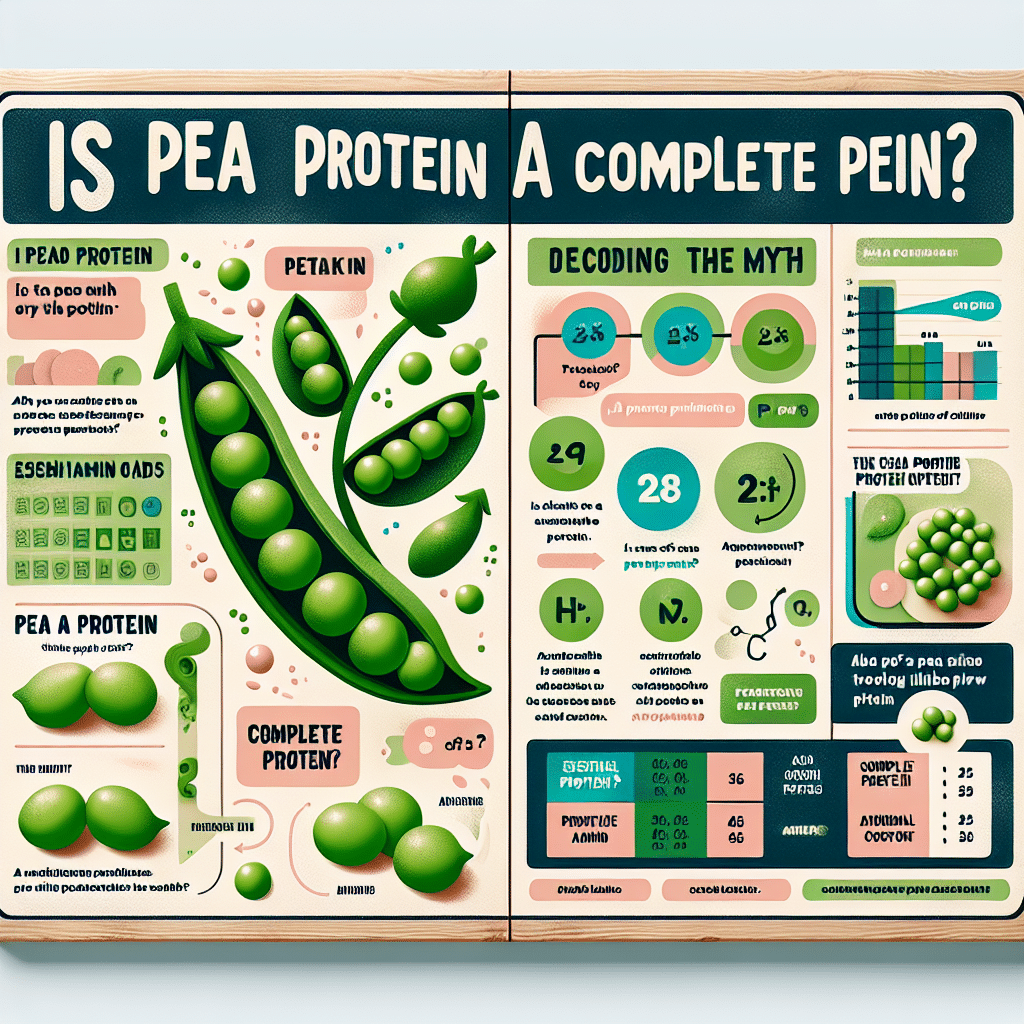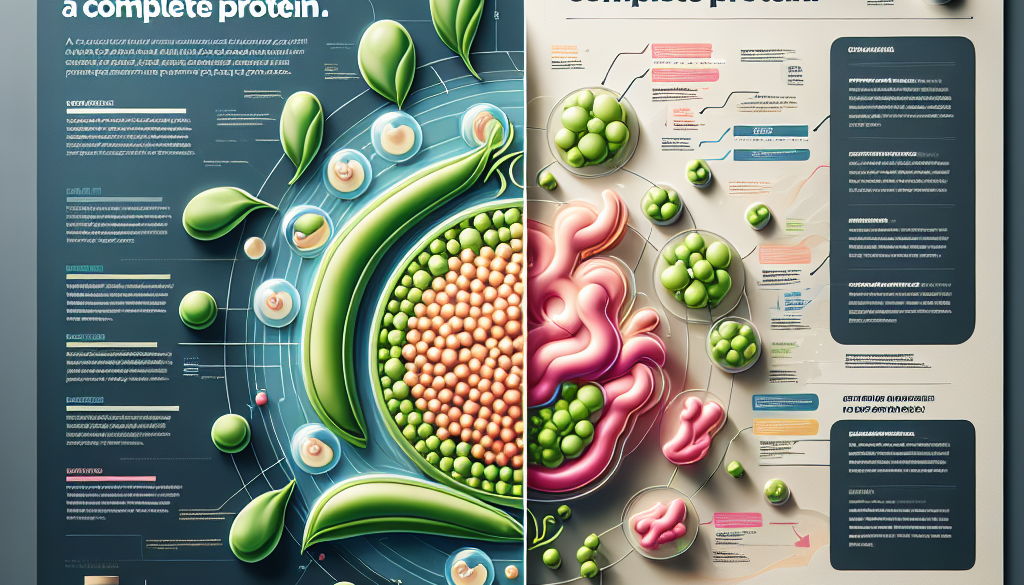Is Pea Protein a Complete Protein: Decoding the Myth
-
Table of Contents
Is Pea Protein a Complete Protein: Decoding the Myth

When it comes to protein, there are numerous options available in the market. One such option that has gained popularity in recent years is pea protein. Pea protein is derived from yellow peas and is known for its high protein content. However, there has been some debate about whether pea protein is a complete protein. In this article, we will delve into the topic and decode the myth surrounding pea protein.
Understanding Complete Proteins
Before we dive into the specifics of pea protein, let’s first understand what complete proteins are. Complete proteins are those that contain all nine essential amino acids that our bodies cannot produce on their own. These amino acids are crucial for various bodily functions, including muscle growth and repair, hormone production, and immune system support.
Traditionally, animal-based proteins like meat, eggs, and dairy products have been considered complete proteins. However, with the rise in plant-based diets, the search for complete protein sources from plants has become more important.
Pea Protein: A Nutritional Powerhouse
Pea protein has gained popularity among vegans, vegetarians, and individuals with dietary restrictions due to its impressive nutritional profile. It is not only rich in protein but also contains a good amount of fiber, vitamins, and minerals. Additionally, pea protein is low in fat and cholesterol-free, making it a healthy choice for many.
One of the main concerns regarding pea protein is its amino acid profile. While it is true that pea protein does not contain all nine essential amino acids, it is not entirely devoid of them either. Pea protein is particularly low in methionine, an essential amino acid. However, this does not mean that pea protein is not a valuable source of protein.
Complementary Proteins: Unlocking the Potential of Pea Protein
Although pea protein may not be a complete protein on its own, it can be combined with other plant-based protein sources to create a complete amino acid profile. This concept is known as complementary proteins. By combining pea protein with other plant-based proteins like rice protein or hemp protein, you can create a complete protein source that contains all nine essential amino acids.
For example, rice protein is low in lysine but high in methionine, which complements the amino acid profile of pea protein. By combining these two protein sources, you can create a complete protein that rivals animal-based proteins in terms of nutritional value.
Benefits of Pea Protein
Pea protein offers several benefits that make it an attractive choice for individuals looking to increase their protein intake:
- High protein content: Pea protein typically contains around 20-25 grams of protein per serving, making it an excellent source of protein for athletes and individuals with high protein requirements.
- Easy digestion: Pea protein is easily digestible compared to some other protein sources, making it suitable for individuals with sensitive stomachs.
- Plant-based and vegan-friendly: Pea protein is derived from plants, making it a suitable option for individuals following a vegan or vegetarian lifestyle.
- Allergen-free: Pea protein is free from common allergens like dairy, soy, and gluten, making it a safe choice for individuals with food sensitivities or allergies.
Case Studies and Statistics
Several studies have been conducted to evaluate the efficacy of pea protein as a protein source. One study published in the Journal of the International Society of Sports Nutrition found that pea protein supplementation resulted in similar muscle thickness gains compared to whey protein in resistance-trained men.
Another study published in the Journal of Food Science and Technology compared the digestibility and amino acid profile of pea protein to that of whey protein. The study found that pea protein had a similar digestibility rate and amino acid profile to whey protein, further supporting its efficacy as a protein source.
According to a report by Grand View Research, the global pea protein market is expected to reach USD 394.6 million by 2025, driven by the increasing demand for plant-based protein sources and the rising popularity of vegan and vegetarian diets.
Summary
While pea protein may not be a complete protein on its own, it is a valuable source of protein that can be combined with other plant-based proteins to create a complete amino acid profile. Pea protein offers numerous benefits, including high protein content, easy digestion, and allergen-free attributes. With the growing demand for plant-based protein sources, pea protein is expected to continue gaining popularity in the coming years.
About ETprotein
ETprotein, a reputable protein Chinese factory manufacturer and supplier, is renowned for producing, stocking, exporting, and delivering the highest quality organic bulk vegan protein and plant proteins. They include Organic rice protein, clear rice protein, pea protein, clear pea protein, pumpkin seed protein, sunflower seed protein, mung bean protein, etc. Our offerings, characterized by a neutral taste, non-GMO, allergen-free attributes, cater to a diverse range of industries. We serve nutraceutical, pharmaceutical, cosmeceutical, veterinary, as well as food and beverage finished product distributors, traders, and manufacturers across Europe, USA, Canada, Australia, Thailand, Japan, Korea, Brazil, and Chile, among others.
Our specialization includes exporting and delivering tailor-made protein powder and finished nutritional supplements. Our extensive product range covers sectors like Food and Beverage, Sports Nutrition, Weight Management, Dietary Supplements, Health and Wellness Products, and Infant Formula, ensuring comprehensive solutions to meet all your protein needs.
As a trusted company by leading global food and beverage brands and Fortune 500 companies, ETprotein reinforces China’s reputation in the global arena. For more information or to sample our products, please contact us and email sales(at)ETprotein.com today.












